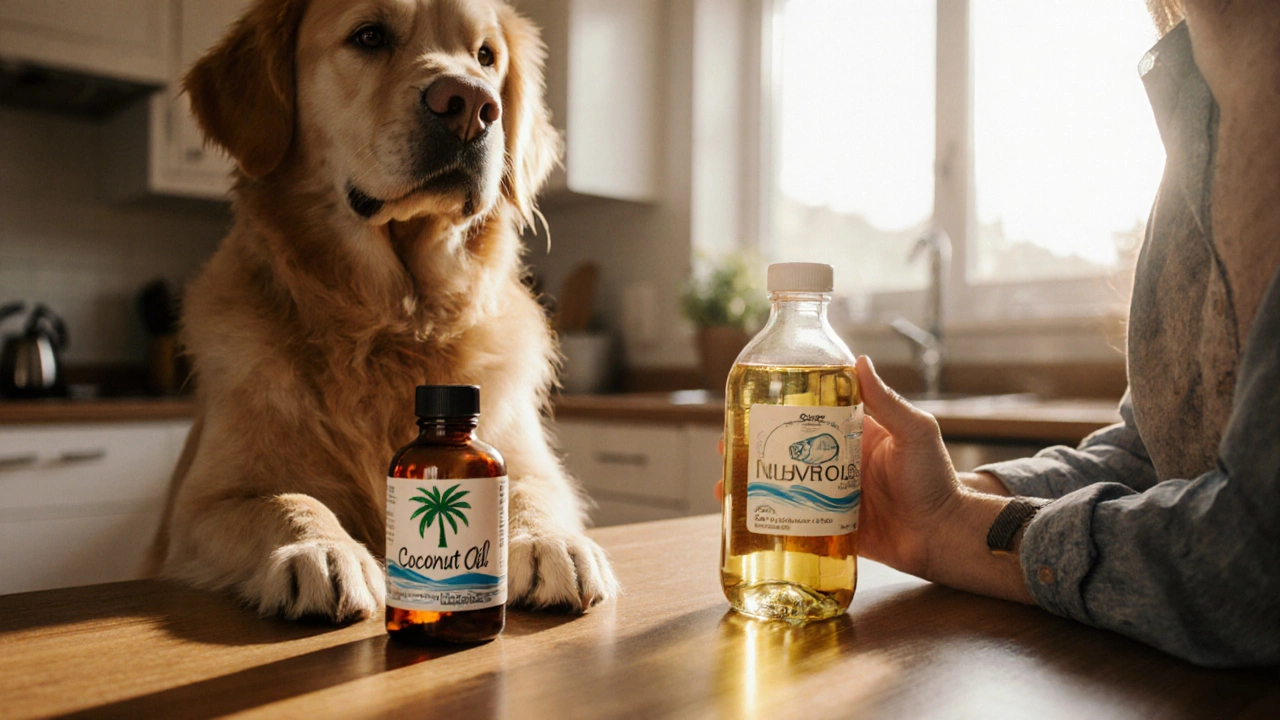Dog Oil Recommendation Calculator
Choose Your Dog's Situation
This tool helps you determine which oil (coconut or fish) is better for your dog based on your dog's size, primary health concern, and any special conditions.
Ever wondered if the tropical scent of coconut oil can beat the classic fish oil supplement for your dog? With pet parents scrolling through endless product pages, the debate feels like a tug‑of‑war between two popular oils. Below we break down the science, the practical side‑effects, and how to choose the right supplement for your four‑legged friend.
What Exactly Is Coconut Oil?
Coconut Oil is a plant‑derived fat extracted from the meat of mature coconuts. It’s rich in saturated fats, especially lauric acid, and has been praised for its antimicrobial properties. In human nutrition, it’s often touted for skin health and quick energy, but how does it translate to canine nutrition?
What Exactly Is Fish Oil?
Fish Oil is an animal‑based oil harvested from fatty fish like salmon, mackerel, or sardines. Its hallmark is high concentrations of omega‑3 fatty acids, primarily eicosapentaenoic acid (EPA) and docosahexaenoic acid (DHA). These compounds are the powerhouse behind many of fish oil’s health claims for dogs.
The Fatty Acid Profile: A Quick Science Check
- Lauric acid - dominates coconut oil, makes up about 50 % of its total fat. Known for antimicrobial action.
- EPA and DHA - the two main omega‑3s in fish oil, together account for roughly 30‑40 % of a high‑quality fish oil supplement.
- Omega‑6 to Omega‑3 ratio - coconut oil is low in omega‑3s, giving a high omega‑6:omega‑3 ratio, whereas fish oil flips that balance, offering a low ratio ideal for reducing inflammation.
Understanding these numbers is key because the ratio influences how the body handles inflammation, joint health, and skin condition.
Benefits on the Dog’s Body
Skin and Coat
Both oils claim to improve the shine and softness of a dog’s coat. Coconut oil’s lauric acid can moisturize the skin, but it may also clog pores if a dog’s skin is oily. Fish oil, with EPA and DHA, directly reduces inflammation that causes itchy, flaky skin, and it supports a glossy coat by fostering healthy hair follicles.
Joint and Bone Health
Inflammation is the enemy of flexible joints. Omega‑3s from fish oil have been shown in multiple veterinary studies to lower joint pain in arthritic dogs. Coconut oil’s anti‑microbial benefit does little for joint lubrication; its saturated fat can even contribute to weight gain, which puts extra stress on joints.
Heart and Immune System
EPA and DHA improve heart rhythm and reduce triglyceride levels-important for senior dogs prone to cardiac issues. Coconut oil’s medium‑chain triglycerides (MCTs) provide quick energy but do not have the same cardioprotective effect. However, lauric acid does have modest antiviral properties, which can be a side benefit for dogs with recurrent skin infections.
Digestive Considerations
Fish oil can cause a temporary fishy smell in breath and stool, and in high doses, may lead to loose stools. Coconut oil can be easier on the stomach in small amounts, but because it’s high in saturated fat, excessive use may cause pancreatitis in predisposed breeds.

How to Choose the Right Supplement for Your Dog
- Identify the primary health goal. If you’re fighting itchy skin or arthritis, fish oil usually wins. If you need a quick skin barrier boost or want to add a flavor enhancer to homemade meals, coconut oil can be helpful.
- Check the source and purity. Look for “molecularly distilled” fish oil to avoid heavy metals. For coconut oil, choose “virgin, cold‑pressed” to preserve lauric acid.
- Match the dosage to your dog’s size. Smaller breeds (under 20 lb) need far less oil-often a quarter of a teaspoon daily. Larger breeds can tolerate up to a teaspoon, but never exceed the manufacturer’s recommendation.
- Consult your veterinarian. Dogs with gallbladder disease, pancreatitis history, or on blood‑thinning medication need professional guidance before adding any oil.
Below is a side‑by‑side view to make the decision faster.
| Aspect | Coconut Oil | Fish Oil |
|---|---|---|
| Main fatty acids | Lauric acid (≈50 %) + MCTs | EPA & DHA (≈30‑40 %) |
| Omega‑3 content | Very low | High |
| Typical dosage (medium dog) | ½ tsp daily | 1 tsp (≈1000 mg EPA/DHA) daily |
| Key benefits | Skin barrier, quick energy, antimicrobial | Anti‑inflammatory, joint support, heart health, coat shine |
| Potential risks | Weight gain, pancreatitis in sensitive breeds | Fishy odor, mild diarrhea, rare vitamin E depletion |
Real‑World Scenarios: When One Beats the Other
Scenario 1 - Senior Labrador with arthritis: The vet recommends a fish oil supplement because EPA and DHA directly reduce joint inflammation. Adding a teaspoon of fish oil to the daily kibble helps the dog move more comfortably.
Scenario 2 - Young Boxer with a flaky coat: The owner notices that a splash of virgin coconut oil in the diet improves coat sheen within a week. Since the dog isn’t prone to weight issues, the low‑dose coconut oil works as a short‑term skin booster.
Scenario 3 - Dog with a history of pancreatitis: Coconut oil’s high saturated fat is risky. The vet advises sticking to a modest fish oil regimen, monitoring for any stool changes.
Scenario 4 - Dog on a grain‑free, homemade diet: coconut oil can be a cost‑effective way to add healthy fat without altering the omega‑3 balance, while fish oil is added only if the diet lacks oily fish.
How to Introduce the Oil Safely
- Start with a tiny amount (¼ tsp for a 30‑lb dog).
- Observe for any digestive upset over 48 hours.
- Gradually increase to the target dose over a week.
- Mix the oil into wet food or a small amount of plain yogurt to mask the flavor.
- Keep a log of coat condition, stool consistency, and activity level.
Skipping the gradual ramp‑up is the most common mistake new pet parents make.

Cost Comparison and Availability
In 2025, a 16‑oz jar of high‑quality virgin coconut oil averages $12‑$15 in the US and €10‑€13 in Europe. Fish oil capsules or liquid bottles of comparable size usually range from $20‑$30 (USD) depending on purity. While coconut oil is cheaper per ounce, you typically need a higher volume to match the omega‑3 dose, which balances the cost.
Bottom Line: Which Oil Wins?
If your dog’s primary concern is coconut oil for dogs with a focus on skin barrier and a mild energy boost, a modest daily spoonful of virgin coconut oil can be a handy addition. However, for chronic inflammation, arthritis, heart health, or a glossy coat, fish oil consistently outperforms coconut oil because of its high EPA/DHA content.
Most veterinarians agree that the best approach isn’t a strict either/or but a tailored mix-use a base of fish oil for omega‑3s and sprinkle a tiny dash of coconut oil for extra skin protection when needed.
FAQ
Can I give my dog coconut oil and fish oil together?
Yes, but keep the total fat intake under 10 % of your dog’s daily calories. Use a low dose of coconut oil (¼‑½ tsp) and stick to the recommended fish oil dosage to avoid weight gain.
How long does it take to see coat improvements?
Most owners report noticeable shine and reduced shedding within 3‑4 weeks of consistent supplementation, provided the dosage is correct and the diet is balanced.
Is coconut oil safe for puppies?
Puppies have delicate digestive systems. Start with a very small amount (⁄⁄¼ tsp for a 5‑lb puppy) and only after a month of tolerance should you consider a regular dose.
What should I look for on a fish oil label?
Choose a product that lists EPA and DHA amounts per serving, is molecularly distilled to remove mercury, and has a third‑party certification like IFOS.
Can fish oil cause a fishy smell on my dog?
Yes, especially with liquid fish oil. Mixing it thoroughly into wet food or using flavored capsules can mask the odor.
Got more questions? A quick chat with your vet can personalize the dosage and ensure your dog gets the right balance of healthy fats.

